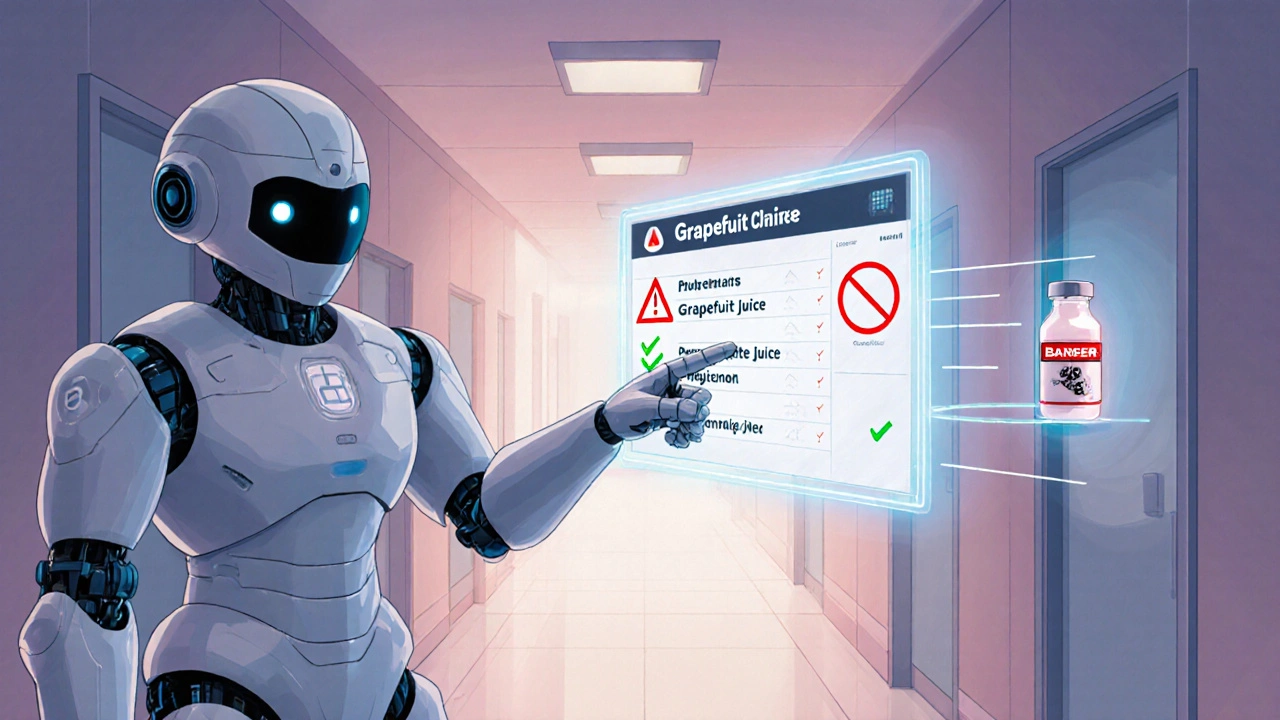Pomegranate Juice vs Medications: Does It Interact Like Grapefruit?
 Oct, 26 2025
Oct, 26 2025
Patients love the tart sparkle of pomegranate juice a fruit‑based beverage rich in polyphenols and antioxidants, but many wonder if it plays the same trick on drugs as the infamous grapefruit juice. The short answer? In labs it looks risky, but in real‑world patients the danger is almost nil. This article untangles the science, compares the two juices, and shows clinicians exactly what to tell their patients.
What are CYP enzymes and why do they matter?
Cytochrome P450 (CYP) enzymes are a family of proteins that break down most prescription meds. Two members dominate the conversation: CYP3A4 the enzyme that processes about half of all marketed drugs and CYP2C9 responsible for roughly 15% of drug metabolism, including many anticoagulants. When a food or supplement blocks these enzymes, the drug stays in the bloodstream longer, potentially causing toxicity.
Lab findings: why pomegranate juice looked scary
Early in‑vitro work, like the 2005 study from Gifu Pharmaceutical University, mixed human liver microsomes with 5 % (v/v) pomegranate juice. The result? Almost complete shutdown of CYP3A activity-very similar to what grapefruit juice does. The inhibition grew stronger the longer the juice sat with the enzymes, hinting at a mechanism‑based effect. Animal tests echoed this, showing a 1.5‑fold rise in carbamazepine exposure when rats drank juice before the drug.
Human trials tell a different story
When researchers moved to people, the picture changed. In 2012 Hanley and colleagues gave volunteers pomegranate juice daily for a week and measured flurbiprofen (a CYP2C9 substrate). The area under the curve (AUC) and peak concentration (Cmax) were within 2 % of control values-well inside normal variability. A 2013 trial with midazolam, a classic CYP3A4 probe, showed the same negligible shift. Both studies concluded that the juice does not meaningfully alter drug exposure in humans.

Grapefruit juice vs. pomegranate juice: side‑by‑side
| Aspect | Pomegranate juice | Grapefruit juice |
|---|---|---|
| Primary CYP inhibition (in‑vitro) | Strong CYP3A & CYP2C9 inhibition (similar potency to grapefruit) | Strong CYP3A inhibition |
| Clinical impact (human studies) | No significant change in AUC or Cmax for tested drugs | Up to 300% increase in AUC for drugs like felodipine |
| Regulatory warnings | None (FDA, EMA) | Warnings for 85+ medications (FDA) |
| Typical concentration reaching gut wall | Low‑to‑moderate polyphenol levels; rapid metabolism | High furanocoumarin levels that survive digestion |
The contrast is stark: grapefruit juice consistently creates clinically relevant interactions, while pomegranate juice remains a laboratory curiosity.
How clinicians should counsel patients
- Tell patients that current evidence does NOT require avoiding pomegranate juice with most prescription meds.
- Emphasize the difference between juice and concentrated extracts-some case reports link pomegranate extract (not juice) to higher INR values in warfarin users.
- Keep standard grapefruit‑juice warnings for drugs known to be affected, such as certain statins, calcium‑channel blockers, and some immunosuppressants.
- If a patient is on a narrow‑therapeutic‑index drug (e.g., carbamazepine, certain chemotherapeutics), a brief note about the theoretical risk is prudent, but no formal restriction is needed.
Surveys show many clinicians still mistakenly flag pomegranate juice the same way as grapefruit. A 2016 study found 68 % of physicians believed a restriction was needed-highlighting the need for updated continuing‑education modules (about 2-3 hours) to close this gap.
Patient anecdotes and real‑world experiences
Online forums paint a reassuring picture. On Reddit’s r/Pharmacy, 89 % of responding pharmacists said they never advise patients to stop drinking pomegranate juice, citing the lack of clinical data. A Drugs.com user on warfarin reported stable INR values while sipping the juice daily for six months. The only published red flag involved a case where a patient took a concentrated pomegranate extract, not the juice, and saw INR spike-underscoring the importance of product form.

Regulatory and database perspectives
The FDA U.S. Food and Drug Administration lists grapefruit juice as a strong CYP3A inhibitor but omits pomegranate juice altogether. Similarly, the European Medicines Agency’s 2023 guideline does not mention pomegranate juice. The University of Washington’s Drug Interaction Database (Sept 2024) rates pomegranate juice evidence as ‘B’ (moderate evidence against interaction) for both CYP3A4 and CYP2C9 substrates, while grapefruit juice earns an ‘A’ (strong evidence for interaction).
Future research directions
Scientists are now focusing on pomegranate extracts, which contain higher concentrations of the active polyphenols. A 2022 review in Clinical Pharmacokinetics flagged extracts as a “research priority”. The NIH has funded a $2.4 M grant (2023‑2024) to study how pomegranate compounds affect intestinal transporters, which could reveal subtle effects not captured in current juice studies.
Bottom line for healthcare providers
When asked, “Should my patient stop drinking pomegranate juice while on medication?” the evidence says: No, not for standard prescription drugs. Keep the grapefruit‑juice alerts where they belong, educate staff about the juice vs. extract distinction, and stay tuned for upcoming extract studies. This approach avoids unnecessary diet restrictions while maintaining medication safety.
Does pomegranate juice affect blood thinners like warfarin?
Current clinical trials show no meaningful impact on INR when patients drink regular pomegranate juice. Only isolated case reports with concentrated extracts suggest a possible effect, so advise patients to stick with juice, not supplements.
Can I safely take a CYP3A4 substrate like midazolam with pomegranate juice?
Yes. A 2013 crossover study found the juice did not change midazolam’s AUC or Cmax, indicating no clinically relevant interaction.
Why do lab tests show strong inhibition but patients don’t experience it?
In vitro experiments use high juice concentrations directly on isolated enzymes, bypassing digestion and metabolism. In humans the active compounds rarely reach the gut wall at inhibitory levels.
Should I warn patients about pomegranate extract supplements?
Yes. Extracts contain higher concentrations of polyphenols and may behave differently. Until more data emerge, advise caution or avoidance with narrow‑therapeutic‑index drugs.
Is there any regulatory label required for pomegranate juice?
No. Neither the FDA nor the EMA list pomegranate juice as a drug interaction risk, so no warning labels are mandated.
laura balfour
October 26, 2025 AT 16:04Wow, the whole lab‑to‑human saga feels like a bloackbuster thriller – the juice swoops in, shuts down enzymes in a petri dish, and then disappears into the ether of our everyday breakfasts.
The in‑vitro drama is real, but the gut wall is more like a bouncer that lets most of the polyphenols slip right past.
So while the science looks ominous, most patients just enjoy the tart sparkle without any zombie‑like drug effects.
It’s a classic case of “what looks scary on paper may be a harmless sip”.
Bottom line: no need to ban the juice unless you’re sipping a super‑concentrated extract.
Alisha Cervone
October 30, 2025 AT 16:04Looks fine to me, no need for extra warnings.
Diana Jones
November 3, 2025 AT 16:04Let’s unpack this with a dash of pharmacokinetic glamour – the pomegranate juice saga is a perfect textbook example of how in‑vitro potency doesn’t necessarily translate to in‑vivo significance.
The CYP3A4 inhibition observed at 5% juice concentration is impressive on paper, yet the AUC and Cmax metrics from human crossover studies hover within the 2% variance zone, essentially nullifying any clinical alarm.
One could argue the juice’s polyphenolic cocktail is a “weak inhibitor” that never reaches the intestinal lumen at pharmacologically relevant concentrations.
Moreover, the reliance on midazolam and flurbiprofen as probe substrates, while standard, may mask substrate‑specific nuances that only a broader panel could reveal.
Still, the overall data set suggests the juice’s inhibitory potency is more of a laboratory curiosity than a prescribing nightmare.
From a therapeutic standpoint, the risk‑benefit calculus remains heavily weighted toward the antioxidant benefits of the juice, especially when contrasted with the well‑documented grapefruit‑juice interactions that can swell AUC by up to 300%.
In short, unless you’re dealing with a narrow‑therapeutic‑index drug and a high‑dose concentrate, the juice is unlikely to rewrite the pharmacodynamic script.
Abbey Travis
November 7, 2025 AT 16:04Hey folks, just a quick heads‑up: most of the big studies used regular pomegranate juice, not those super‑concentrated extracts you sometimes find in health stores.
If your patients love a morning glass, let them enjoy it – the evidence doesn’t support a blanket restriction.
Just keep an eye on those on warfarin or other tight‑window meds and make sure they stick to juice, not supplements.
And as always, a brief note in the chart never hurts.
ahmed ali
November 11, 2025 AT 16:04Okay, let me break this down step by step because the internet loves to throw around “dangerous juice” headlines without the proper nuance.
First, the in‑vitro data showing near‑complete CYP3A4 shutdown at 5% concentration is scientifically fascinating, but it’s an artificial scenario where the juice is directly bathed with liver microsomes, bypassing digestion, metabolism, and first‑pass effects.
Second, when you translate that to a human being drinking a glass, the actual concentration that reaches the intestinal enzymes is drastically lower due to dilution and rapid conjugation of the polyphenols.
Third, the clinical trials – the 2012 flurbiprofen study and the 2013 midazolam crossover – both reported changes well within normal inter‑subject variability, essentially a statistical noise floor.
Fourth, the pharmacokinetic parameters, AUC and Cmax, are the gold standard for assessing exposure, and those numbers didn’t budge in any meaningful way.
Fifth, let’s not forget the case reports involving concentrated pomegranate extracts, which are a different beast altogether – they contain higher levels of the active furanocoumarins and have been linked to INR spikes in warfarin patients.
Sixth, the FDA and EMA have explicitly omitted pomegranate juice from their interaction warning lists, a regulatory decision that reflects the weight of the totality of evidence.
Seventh, the difference between juice and supplement is crucial; the latter can deliver doses of polyphenols that simply aren’t achievable through normal dietary consumption.
Eighth, the variability in individual gut flora can further modulate how much of the active compounds survive to the site of CYP interaction, adding another layer of complexity that makes blanket statements unfair.
Ninth, the broader pharmacological community is moving toward evidence‑based guidance, and the consensus now is that pomegranate juice does not warrant the same caution as grapefruit juice for most drugs.
Tenth, for the handful of narrow‑therapeutic‑index drugs, a brief note about theoretical risk is prudent, but it doesn’t rise to the level of a contraindication.
Eleventh, if a clinician is still uneasy, they can always order a therapeutic drug monitoring check after the patient starts or stops the juice – that’s the safest, most pragmatic approach.
Twelfth, the cost‑benefit ratio favors allowing patients to enjoy the antioxidant‑rich beverage, especially given the potential cardiovascular benefits that have been observed in epidemiological studies.
Thirteenth, remember that the food‑drug interaction landscape is always evolving; new data on extracts could shift the paradigm, but for now the juice itself is low‑risk.
Fourteenth, the take‑home message is simple: enjoy your pomegranate juice, but keep an eye on the form and the specific medication you’re on.
Fifteenth, and finally, if you’re ever in doubt, consult the latest interaction database or a clinical pharmacist – they’ll have the most up‑to‑date syntheses of the research.
Sixteenth, all of this underscores why we need to differentiate between "lab curiosity" and "clinical relevance" when advising patients.
Deanna Williamson
November 15, 2025 AT 16:04The data set is fairly robust, but the occasional case report on extracts does raise a red flag for patients on anticoagulants.
While the juice itself appears benign, the variability in supplement formulations can’t be ignored.
Clinicians should document any supplement use, even if it seems innocuous.
Overall, the risk profile remains low for standard juice consumption.
Chris L
November 19, 2025 AT 16:04I’m with the optimistic view – the evidence leans heavily toward safety for regular juice.
If a patient mentions they love pomegranate in the morning, reassure them that there’s no need for a hard stop.
Just keep an eye on those on very tight‑window drugs and consider a quick blood level check if you’re uneasy.
That way we stay safe without unnecessarily restricting diet.
Leah Ackerson
November 23, 2025 AT 16:04✨The contrast between grapefruit and pomegranate is like night vs. day – one’s a notorious troublemaker, the other a friendly neighbor.🍇
Remember, it’s the extracts that can be the sneaky culprits, not the juice you sip.🔬
So keep drinking, but stay savvy about supplement labels!💡
Gary Campbell
November 27, 2025 AT 16:04There’s a hidden agenda in the pharma industry to keep us scared of “natural” foods, pushing the grapefruit myth to sell more expensive meds.
Look at the data – the juice never reaches inhibitory concentrations in the gut, yet the narrative stays the same.
It’s all about controlling the market, not protecting patients.
If you dig deeper, you’ll see the same pattern with other “dangerous” foods that never cause real harm.
Stay critical and question the sources of these warnings.
renee granados
December 1, 2025 AT 16:04It’s simple: juice is fine, extracts are risky.
Stick to the drink, avoid the pills.
Stephen Lenzovich
December 5, 2025 AT 16:04One must assess the pharmacodynamic landscape with a discerning eye, for the allure of sensational headlines often eclipses the nuanced reality.
In the case of pomegranate juice, the empirical evidence positions it within the realm of negligible interaction, particularly when contrasted with the well‑documented grapefruit paradigm.
Nevertheless, a sagacious clinician will remain vigilant, especially when prescribing agents with a narrow therapeutic index.
The distinction between the juice and its concentrated extracts cannot be overstated; the latter may harbor sufficient bioactive concentration to perturb metabolic homeostasis.
Thus, while the juice itself may be accorded a benign status, the extract warrants circumspection.
In sum, clinical prudence dictates embracing the juice while maintaining a measured skepticism toward supplemental formulations.
Ramesh Kumar
December 9, 2025 AT 16:04Great summary! The key point is that pomegranate juice doesn’t act like grapefruit in real‑world settings.
If you’re on a standard medication, you can keep enjoying it.
Just be cautious with warfarin and avoid high‑dose extracts.
Feel free to check the latest drug interaction database for any updates.
Barna Buxbaum
December 13, 2025 AT 16:04That was a thorough breakdown, Ahmed – really appreciated the step‑by‑step walk‑through.
It reinforces why we can comfortably tell patients the juice is safe for most meds.
Keeping an eye on extracts, as you mentioned, is the sensible middle ground.
asha aurell
December 17, 2025 AT 16:04Exactly, no need for extra warnings on the juice.